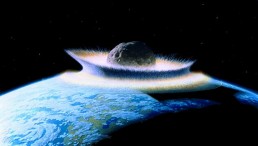Dead Dolphin With Bleeding Eyes, Hole Along Its Mouth Washes Ashore on New Jersey Beach; Sonar Blast to Blame?
A dead dolphin was spotted on the sands of Avalon on a beach in New Jersey. Its eyes were bleeding, and it had a noticeable hole along its mouth. Its gruesome death sparked an investigation into finding out the cause of its death.
Dead Dolphin Washed Ashore in New Jersey
The marine mammal was spotted lifeless on Feb. 19. The reason behind its death has remained unknown. However, locals speculate that sonar blasting from an offshore wind company mapping the seafloor is to blame.
According to reports, solar blasts disrupt animals' movements and send them into boats or shore. Research has demonstrated that marine mammals may swim hundreds of miles at high speed when exposed to strong sonar frequencies.
Jamie Steiert, an Avalon local, was the one who found the dead dolphin on the beach. According to Steiert, its eyes appeared to be missing, and the blood pouring from the hole was still fresh.
The spot near the lower jaw that was bleeding piqued Steiert's interest. They wondered whether something tried scavenging after it wasn't bleeding when it washed up. When they arrived at the 75th Street beach, they only found a police officer sitting in the car. There were no seagulls or other birds in the area.
A conservation officer from New Jersey picked up the remains and said he would meet with the Marine Mammal Stranding Center. There were claims that the dolphin was scavenged. Steiert has repeatedly asked for documentation proving no hearing impairment, but they have never been given access. They were concerned that the animal's death was due to sonar blasts.
However, experts doubt that the sonar blast was to blame. An external examination would not reveal any evidence of sonar trauma.
Bonnie Brady, executive director at Long Island Commercial Fishing Association, identified the dead marine mammal as a short-beaked common dolphin. They can be found between 650 to 6,500 feet deep.
According to Justin Viezbicke, the stranding coordinator from the National Oceanic and Atmospheric Administration, birds usually feed on carcasses that float around or rest on the beach. The round hole and bleeding eye socket are most likely the result of a bird pecking at the lower jaw and consuming the eye.
The only way to determine whether a marine animal died due to sonar is to perform a necropsy and analyze the ear bone for damage.
ALSO READ: Pink River Dolphin: 5 Fun Facts About the Freshwater Cetacean With the Largest Bodies and Brain
Sonar Blast Could Hurt Marine Life
The Navy uses sonar to track enemy submarines, mines, torpedoes, and other undersea hazards. Sonar operators use sound pulses to scan the ocean for echoes from items struck by the waves.
According to a study, the noise can interfere with marine creatures' eating schedules. Certain whale species may also be startled by the sound and quickly surface.
The Navy calculates that the deployment of sonar and explosives may inadvertently result in more than 1,600 cases of hearing loss or other injuries to marine animals annually. It might also take the lives of over 200 marine mammals annually.
The Navy does not claim that sonar could harm whales and dolphins while it trains sailors and tests equipment. It is, however, alerting the public and environmental authorities to the possibility that its actions could injure animals or cause them to react in some other way.
When marine mammals are discovered close by, the Navy switches off sonar as one of several precautions against harming the animals. It claims that, as a result, there would be fewer actual animal injuries.
RELATED ARTICLE: Unidentified Serpent-Like Creature in New Orleans City Park Lagoon Sparks Loch Ness Monster Rumors [Watch]
Check out more news and information on Dolphins in Science Times.














